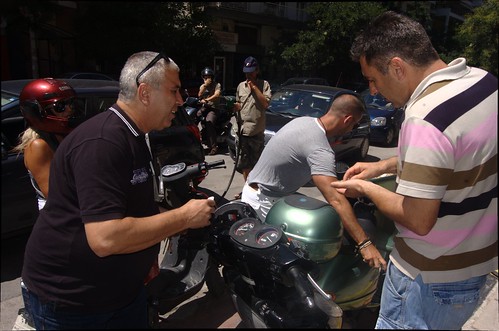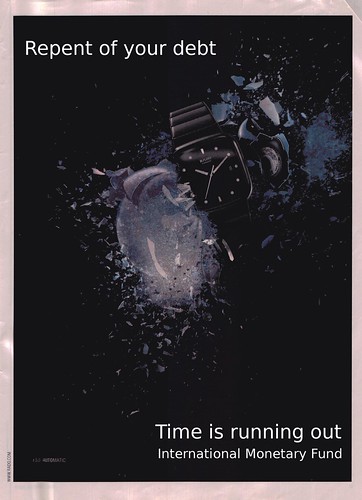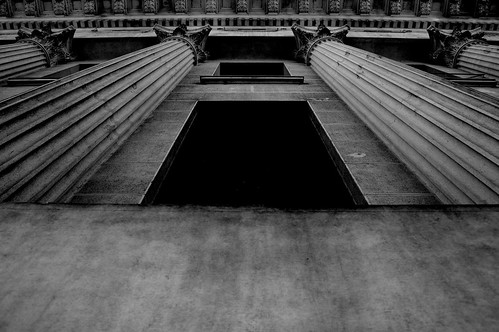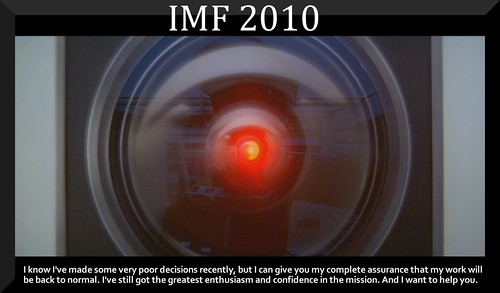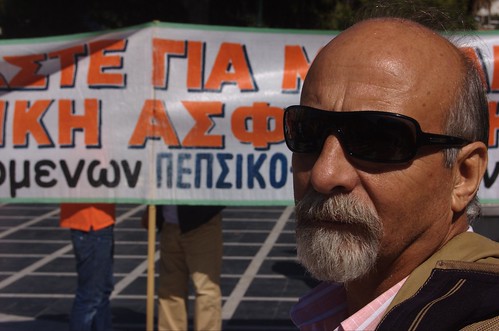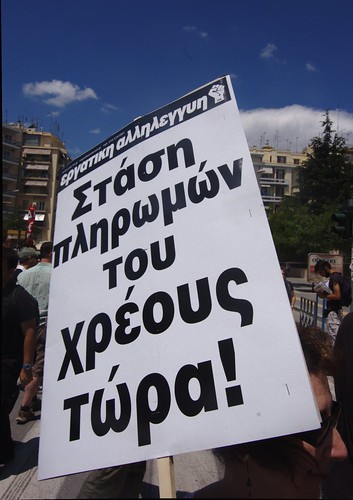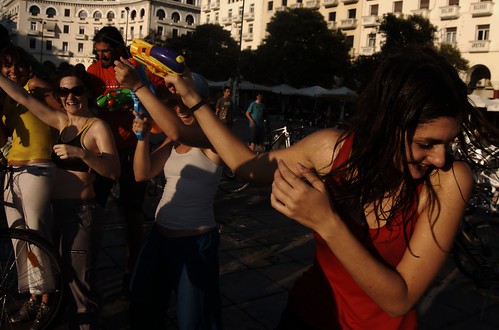The latest round of talks this morning between leaders of Greece's truck drivers associations and the government failed to find common ground and so the industrial action which is likely to see the country ground to a halt in the next few days is set to continue.
The dispute was the result of attempts by Athens to liberalise Greece's transport market by opening up the trucking profession to everyone with a heavy goods licence and so doing away with the existing permit system which has meant that like taxis, only those registered can operate.
On the one hand the opening up the profession is part of the IMF/EU/ECB process of making Greek products more competetive by reducing transport costs however, drivers associations argue that the sudden implementation of the system means that many of their members stand to lose hundreds of thousands of euros spent obtaining an operating licence.
Instead of petering out strike actions are set to escalate as Greek international truck drivers associations are also preparing to join the strike so threatening imports and exports to other EU countries.
The Greek media has been speculating on whether the government will be forced to bring in the army to make sure the country does not run out of fuel and other basic goods.
Wednesday, July 28, 2010
Greek truckers' strike bites harder
Tuesday, July 27, 2010
Monday, July 26, 2010
Life in a Day - Drama, action, turmoil but no pictures
Saturday, July 24, 2010
Stress test claims one Greek bank
The much hyped stress test of Europe's banking system is intended to ally fears in the world money markets over the ability of the continent's financial system to weather a meltdown. In the end just seven of the 91 banks failed to make the mark, five Spanish, one German and one Greek.
Athens is claiming this as proof of the rude health of Greece's banking institution and the state run TV channels are running the story as if it was a 5-1 victory in the World Cup. However, by strange coincidence the one institution that failed the test is the state controlled ATE (Agricultural Bank of Greece) which is also responsible for hundreds of million in loans to the country's two largest parties. The ruling PASOK party lead by Giorgos Papandreou owes 98,6 million euros whereas the opposition New Democracy party which was in power till last September has debts of 105 million.
In addition the parties also owe sizeable amounts to Piraeus bank which narrowly escaped the same fate as ATE. It seems strange that the two banks which fared worse in the stress test are the one so intimately associated with parties in government.
A mind more suspicious than my own might come to the conclusion that ATE and perhaps Piraeus have been used as a private piggy bank by those in power and that much of ATE's present weakness comes from the Greek State's chronic inability to maintain a distinction between the needs of the Party (whatever ideological colours it purports to fly) and the needs of the country.
Friday, July 23, 2010
Taking a break
I though I would take time out from the usual stories of doom and gloom and write about something more pleasant. Since, believe it or not the life goes on much as it usually does here in Greece despite all that you may read on this blog or in the newspapers. people work, laugh, fall in love have fun and the like.
Me and Lydia went to a concert a few days ago in the centre of Thessaloniki organised by a soft - drinks company. It was an example of naked self - promotion but despite that I have to admit it was fun. Being surrounded by so many people have such a great time was infectious and any excuse to forget our troubles is always welcome. Lydia was enthralled by it all and along with half the audience decided to record the event on her mobile. I swear Aristotelous square was a sea of cameras and cell phones.
In addition I finally learnt to do something that I have been meaning to get round to for ages and so with some trepidation I set about learning how to make bread. Much to my surprise the whole procedure was a lot less demanding than I had imagined. Buoyed by success with my first attempt I decided to try my luck again, this time with Lydia's assistance. And once again something emerged from the oven that not only resembled a loaf of bread but also tasted a lot like it as well.
Tuesday, July 20, 2010
Death of Greek journalist Sokratis Gkiolias unleashes wave of rumours and speculation in local media
Monday, July 19, 2010
The Guardian interview with Giorgos Papandreou - life style puff piece?
"He cuts through the water with agility and speed." gushes Helena Smith, the Guardian's Athens corresponent, who then goes on to describe Greece's embatted prime minister as "statuesque" and later swoons over his "Olympian stamina". Guys, get a room.
This kind of journalism was be hilarious if the story behind it was not so tragic and didn't involved the suffering of so many people. Yet, the Guardian's interview with Papndreou is yet another example of how shallow the foreign media's analysis of what is happening in Greece really is.
We find out from the hard hitting piece that, "you have to make tough decisions in politics" and that "as long as I feel I am doing what I think is right and just for my country, for the Greek people, that is enough for me." While Smith does mention the enormous problems that Greece faces, many the result of the policies adopted by Papandreou's own PASOK party when it was in power she allows many claims by the prime minister to go unchallenged.
For example Papandreou insists that he was unaware of the true extent of Greece's financial woes before taking power in September 2009, a claim that the governor of the Bank of Greece refuted in an interview with the investigative journalism TV show "Neoi Fakeloi" (New Folders) which aired on the Skai TV channel May 2010. According to Giorgos Pavopoulos both the former and present prime minister were told during the national election campaign that the country's national debt was rising fast and likely to reach 12% before the end of 2009.
On the other hand Papandreou is allowed to repeat without challenge the oft heard claims that his government will help mobilise youth to change the country through the setting up of new businesses, especially those connected with renewable sources of energy and "green" initatives. While the sentiments are admirable no details are given about such programs and how they are to be funded when money for services as basic as hospital supplies are drying up. Nor does it seem to be having effect on the growing problem of unemployment which is hitting young Greeks hardest of all with over 30% without work, a figure set to rise still further as the economy continues to shrink.
At no time is the fact that many economists belive that the current IMF/EU/ECB bailout plan is doomed to failure according to many of the world's leading economists who think that the austerity package is most likely to lead to a long term depression reminiscent of 1929. Instead the government's tired old line that the there are no alternatives to the measures is repeated and that the economy will be "reinvigorated". No wonder the interview was warmly and repeatedly quoted on the state run ERT TV news.What we see is yet another example of how "access journalism" reduces reporters to little more than stenographers and cheer leaders for those in power and that by making so many compromises to gain access to their subject the whole point of a newspaper interview is subverted and allowed to become little more than a life style puff piece. The fact it makes its appearance in a newspaper as serious as the Guardian makes it all the more depressing.
Greek journalist executed on own doorstep
The fact that Gkiolias was associated, at least according to much of the Greek press with the controversial Troktiko blog has sent the Greek language blogosphere into a frenzy of speculation over who is responsible for the murder which bears all the hallmarks of a gangland execution. According to the internet based news site in.gr the attack has drawn the attentions of Greece's anti-terrorist agency whilst contributers to Troktiko hint that those behind the killing have connections with elements within the State or "parakratikoi" as they are called in Greek.
Saturday, July 17, 2010
Greece - looking beyond the statistics

As Greeece sinks more and more deeply into economic recession one of the most frustrating aspects of the crisis is the lack of quality coverage from the foreign press. Whilst most Greeks have little of no confidence in the veracity of local media reporting, they do not expect the same kind of low grade journalism from organisations such as the BBC or the Economist.
Friday, July 16, 2010
Thursday, July 15, 2010
Wednesday, July 14, 2010
Tuesday, July 13, 2010
Thessaloniki newspaper victim of arson attack
No group has claimed responsibility for the attack but suspicion has fallen upon far right groups who have been known to use such tactics in the past.
Saturday, July 10, 2010
Life in A Day
Friday, July 09, 2010
Greek general strike - Thessaloniki 8th July 2010
About 3-4000 protesters marched through the centre of Thessaloniki , Greece today to demonstrate against government plans to radically reduce pensions and social benefits.
Wednesday, July 07, 2010
Critical Mass Ride starts with a water fight
The guys with the Critical Mass Ride decided to have some fun while promoting the idea of cycling as an alternative to the internal combustion engine in Thessaloniki by having a water fight. So instead of duelling pistols at dawn it was water pistols at sunset.
It's good to remember that despite all the doom and gloom caused by the economic crisis life goes on, people have fun, joke, laugh, fall in love and have babies and do all the things that the rest of the world does no matter how bleak things seem to get.
Monday, July 05, 2010
Give me debt or give me death
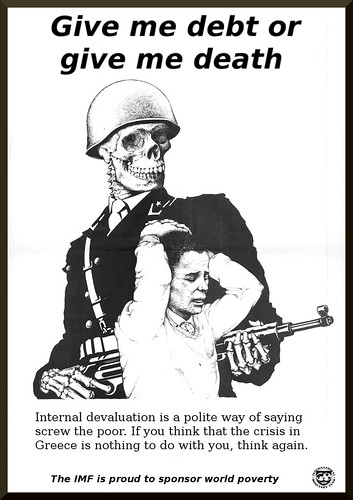
Internal devaluation is just a polite way of saying screw the poor. If you think that the crisis in Greece is nothing to do with you think again.
The Greeks are fighting the first battle in war against those on lower incomes that will, sooner or later involve the rest of the Europe Union. One can only hope that these policies which promise to repeal hard won social reforms are defeated on the shores of the Aegeon.
IMF/EU/ECB - Resistance is anything but futile
One of the worst aspects of the current economic crisis here in Greece is the way it has sucked the hope out of so many people's lives. The current austerity measures offer nothing in the way of hope for the millions of Greeks on lower incomes whose backs are already up against the wall. This sense of dispair limited to any one group or region but rather has spread like some infectious disease throughout the social spectrum.
Talking to friends the conversation always seems to find its way round to the financial mess the country finds itself in. Everyone I know is worried about the future since the massive economic dislocation we are all going through seems to offer nothing but years of poverty and deprivation, negating decades of hard won progress.
For the young the sense of a future deferred, cancelled, even is strongest. What do they have to look forward to? Unemployment, low wage dead end jobs, a life spent living with their parents? After so many years of study and struggle they are coming to the realisation that much of what they were working towards has disappeared and nothing is being offered to take its place.
Prime minister Giorgos Papandreou may talk about the light at the end of the tunnel but few believe his words as they are the same broken promises that the Greek political class have been manking for years. The same wooden language expressing ideas that no one listens to anymore (not helped by the fact that Papandreou is a monumentally awful public speaker).
The fact is that that the recently elected PASOK party has absolutely no popular mandate for the changes they are making to pension schemes and wages since none of the recent measures were in their pre-election manifesto. Papandreou insists that his party had no idea of the size of the deficit they were inheriting on taking power last year (a contention vehermently dened by the head of the Bank of Greece who says that the head of the opposition knew of the massive overshot in public spending figures). Yet it is a measure of the collapse in public trust in the present political system that few are willing to believe him.
Lacking a mandate the leadership of the PASOK party has resorted to fear and intimidation both within and outside parliament to push through legisaltion demanded by the IMF/EU/EB troika. Any MP refusing to follow the party line faces immediate dismissal form the party whilst outside parliament the presence of riot police has become a permanent fixture of demonstrations of any size.
However, this is just the beginning, the real battles lie ahead of us in September when Greek politics traditionally revive after the lethargy of a long, hot summer. Also the effects of the first wave of cuts in wages, rising unemployment and the fall in income from tourism are likely to combine to form a perfect poltical storm. In the face of such massive unrest it is hard to see how Papadreou is going to maintain party discipline amongst PASOK backbenchers already deeply upset about the route the party is taking. Likewise the party base is unhappy with being identified with such wildly unpopular policies.
In addition there is every likelyhood that the Greece will fail to find enough revenue to fulfill Troika (IMF/EU/ECB) targets and will be forced to borrow even more to pay the bills. Already a second rise in VAT has been imposed on an economy struggling to become competitive, a clear indication that government measures to increase revenue are not proving as effective as Papandreou promised.
With a spiralling debt, massive drop in economic activity and steadily rising unemployment how long is it before Athens is forced to renegotiates its debt load?
Thursday, July 01, 2010
Repeat after me: You have no choice
This is the message that the Greek media have been bombarding the country with ever since the PASOK government went cap in hand to the IMF, EU and ECB for a bailout loan that would, it was said save the country from bankruptcy.
Whilst the strict terms under which the the money is being spent may help French and German bankers sleep better at nights the cost of "internal devaluation" have wrecked havoc with those Greeks at the bottom of the ladder. Hit by a triple whammy of large price hikes caused by two increases in VAT, cuts in income and massive rise in unemployment many are struggling to survive, cutting spending on even basic such as groceries to the bone.
This in turn is further deepening the crisis by hammering the country's retail sector which has responded by shedding jobs and so the vicious circle creaks on.Even going to Greece's famed beaches has become a luxury beyond the reach of many as petrol has risen by nearly 60% in less than a year.
The government say we have no choice, there are no alternatives and the measures, as painful as they are are necessary to restore Greece to financial health. However, in the absence of any kind of coherent plan for economic growth the present policy of cutting costs and raising more government revenue through indirect taxation seems a recipe for disaster and is likely to doom the country to a long period of stagnation and poverty the likes of which modern Greece has not experienced in 50 years.
Summer is not traditionally a period of intense political activity here but come September Prime minister Giorgos Papandreou is likely to be faced with an electorate at the end of their tether and outraged by a political system that has been marked by both massive corruption and unbridled incompetence. At that stage even his supporters in the supine national media are not going to be in a position to help him out of the hole he has dug for himself, his party and the country.
